Five CMU Scientists Receive 2018 Sloan Research Fellowships
- Marketing & Communications
- 412-268-4290
Five Carnegie Mellon University faculty members are recipients of 2018 Sloan Research Fellowships. Computer scientists Chris Harrison, Bryan Parno, Andrew Pavlo and Andreas Pfenning and mechanical engineer Venkat Viswanathan are among 126 outstanding North American researchers honored by the Alfred P. Sloan Foundation.
The fellowships, awarded annually since 1955, honor early career scholars whose achievements put them among the very best scientific minds working today. Winners receive a two-year, $65,000 fellowship to further their research.
"The Sloan Research Fellows represent the very best science has to offer," said Sloan President Adam Falk. "The brightest minds, tackling the hardest problems, and succeeding brilliantly — fellows are quite literally the future of 21st century science."
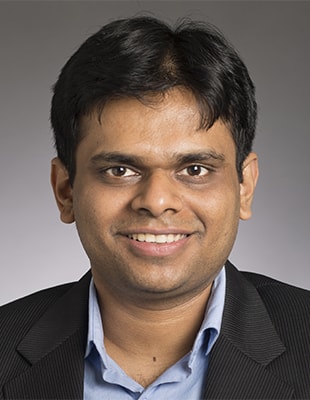
Venkat Viswanathan
Venkat Viswanathan, an assistant professor of mechanical engineering, investigates energy storage and lithium-ion batteries, specifically as they pertain to electric vehicles and planes. He develops computational methods to explore surface electrochemistry for next-generation batteries that are longer-lasting, safer and have higher energy density. These methods are used to develop design principles that make a translational impact, enabling a sustainable economy around electrified transportation, solar fuels and chemicals. Viswanathan joined the CMU faculty in 2014 after earning his Ph.D. from Stanford University and doing postdoctoral research at MIT. He received a National Science Foundation CAREER Award in 2016.
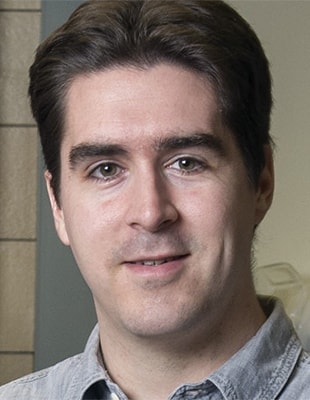
Andreas Pfenning
Andreas Pfenning, an assistant professor of computational biology, is developing computational and experimental genomic techniques to study how genetic differences influence complex traits, with a focus on the brain. He is applying these techniques across species to study how the genome evolved for speech and language production. His group is studying the genetic mechanisms of Alzheimer's disease and aging in humans. Andreas became a faculty member in 2016 after a joint postdoctoral graduate position at MIT and Harvard Medical School. He earned a Ph.D. in computational biology and bioinformatics at Duke University and a bachelor's degree in computer science at Carnegie Mellon. He has published a number of high-impact papers in Nature, Science, Cell and the Proceedings of the National Academy of Science.
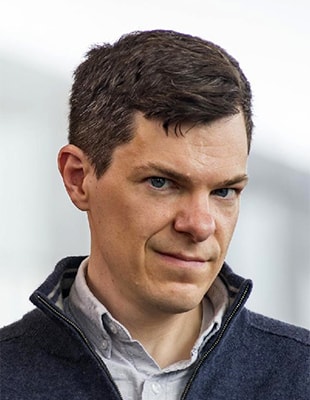
Andrew Pavlo
Andrew Pavlo, an assistant professor of computer science, specializes in the study of database management systems, specifically main memory systems, non-relational systems (NoSQL), transaction processing systems (NewSQL) and large-scale data analytics. He is a member of the Database Group and the Parallel Data Laboratory. He joined the Computer Science Department in 2013 after earning a Ph.D. in computer science at Brown University. He won the 2014 Jim Gray Doctoral Dissertation Award from the Association for Computing Machinery's (ACM) Special Interest Group on the Management of Data.
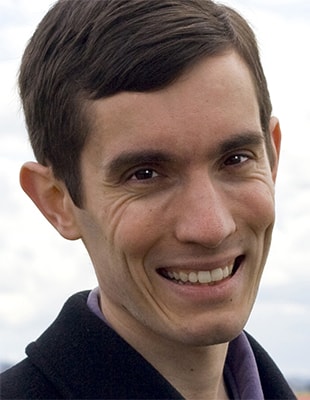
Brian Parno
Bryan Parno, an associate professor with a joint appointment in the Computer Science Department and the Electrical and Computer Engineering Department, investigates long-term, fundamental improvements in designing and building secure systems. His work was incorporated into security enhancements in Intel CPUs and in Microsoft's Windows. He earned his Ph.D. in electrical and computer engineering at CMU in 2010 and his dissertation won the ACM Doctoral Dissertation Award. He worked as a researcher at Microsoft Research before joining the CMU faculty in 2017. In 2011, Forbes magazine selected him as one of the top 30 scientists under age 30.
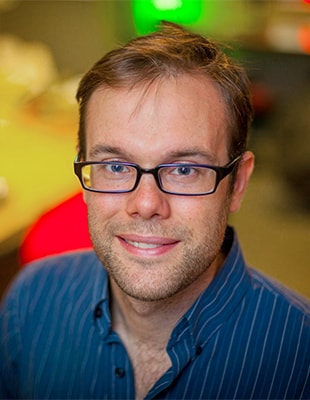
Chris Harrison
Chris Harrison, the Habermann Chair and assistant professor in the Human-Computer Interaction Institute, directs the Future Interfaces Group, which broadly investigates novel sensing technologies and interaction techniques, especially those that empower people to interact with small devices in big ways. These efforts often lie in emerging use modalities, such as mobile computing, touch interfaces and gestural interaction. Harrison was named one of the top 30 scientists under 30 by Forbes, a top 35 innovator under 35 by MIT Technology Review and one of six "innovators to watch" by Smithsonian. He earned his Ph.D. in human-computer interaction at CMU and joined the HCII faculty in 2014.
A full list of the 2018 fellows is available at the Sloan Foundation website.